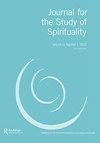The art of sustainable wellbeing: an eastern philosophy approach to cultivating happiness
IF 0.8
0 RELIGION
引用次数: 0
Abstract
ABSTRACTOur jobs are now less secure and more reliant on technology, where knowledge is shared in real time irrespective of the location or time. Although we now have more flexibility in how we work, our work-life boundaries are getting affected, thus becoming blurred. When boundaries are porous, it creates role conflicts and promotes insecurity and tension in one’s life. The existing subjective well-being (SWB) research focuses on observing, measuring, and controlling what is external to the individual and showing ‘what happens’ to SWB when subjective and objective variables are at play. By drawing on Eastern philosophical and spiritual approaches, this paper provides insights into the true nature of our perceived situational awareness of the present moment. It suggests that with techniques such as mindfulness and insight (Vipassana), it is possible to get a deeper understanding of the root causes and effects of consciousness and shape our perceived worldviews and subjective well-being.KEYWORDS: Spiritualitysubjective well-beingmindfulnessequanimityhedonic adaptationhappinessVipassana Disclosure statementNo potential conflict of interest was reported by the author(s).Notes1 ‘Kalaka Sutta: At Kalaka’s Park’ (AN 4.24), translated from the Pali by Thanissaro Bhikkhu. Access to Insight (BCBS Edition), 30 November 2013, http://www.accesstoinsight.org/tipitaka/an/an04/an04.024.than.html.Additional informationNotes on contributorsIndujeeva K. PeirisIndujeeva Peiris holds the position of Principal Academic at Open Polytechnic in New Zealand. His teaching expertise encompasses areas such as Strategic Management, Buyer Behavior, and Project Management. His research interests revolve around Spirituality, Well-being, Leadership, and Sustainability.Renu JoshiRenu Joshi is a Senior Academic at Open Polytechnic in New Zealand, where she specialises in teaching Marketing and Management. Her expertise lies in online courseware development, and she is actively involved in research related to Spirituality, Well-being, and meditative practices.Bernadette FlanaganBernadette Flanagan is Leader of the Research Group Spirituality in Society and the Professions at South East Technological University Ireland. In 2024 her co-edited text (with Kerri Clough) the Routledge International Handbook of Research Methods in Spirituality & Contemplative Studies will be published.Rohana UlluwishewaRohana Ulluwishewa is a former Honorary Research Associate at Massey University in New Zealand. He is Director of the Center for Spirituality in Sustainable Business Management at University of Sri Jayewardenepura, Sri Lanka. He is also the author of two award winning books: Spirituality and Sustainable Development; and Spirituality Demystified: Understanding Spirituality in Rational Terms可持续幸福的艺术:一种培养幸福的东方哲学方法
摘要:现在的工作不那么安全,更依赖于技术,在这种情况下,无论地点或时间,知识都是实时共享的。虽然我们现在在工作方式上有了更多的灵活性,但我们的工作与生活的界限正在受到影响,因此变得模糊。当界限松散时,它会产生角色冲突,并在一个人的生活中增加不安全感和紧张感。现有的主观幸福感(SWB)研究侧重于观察、测量和控制个体的外部因素,并显示当主观和客观变量起作用时,主观幸福感会发生什么。通过借鉴东方哲学和精神方法,本文提供了对我们感知的当前时刻情境意识的真实本质的见解。它表明,通过正念和内观(Vipassana)等技巧,有可能更深入地了解意识的根本原因和影响,并塑造我们感知到的世界观和主观幸福感。关键词:灵性;主观幸福;正念;和谐;注1《卡拉卡经:在卡拉卡公园》(AN 4.24),由塔尼萨罗比丘从巴利文翻译而来。《Access to Insight》(BCBS版),2013年11月30日,http://www.accesstoinsight.org/tipitaka/an/an04/an04.024.than.html.Additional信息投稿人说明indujeeva K. PeirisIndujeeva Peiris是新西兰开放理工学院的首席学术官。他的教学专长包括战略管理、买方行为和项目管理等领域。他的研究兴趣集中在灵性、幸福、领导力和可持续性方面。Renu Joshi是新西兰开放理工学院的高级学者,在那里她专门教授市场营销和管理。她的专长在于在线课件开发,她积极参与与灵性,福祉和冥想实践相关的研究。伯纳黛特·弗拉纳根伯纳黛特·弗拉纳根是爱尔兰东南理工大学社会和职业灵性研究小组的负责人。2024年,她与克里·克拉夫(Kerri Clough)合编的《劳特利奇国际灵性与沉思研究研究方法手册》将出版。Rohana Ulluwishewa是新西兰梅西大学的前名誉研究员。他是斯里兰卡Sri Jayewardenepura大学可持续商业管理灵性中心主任。他还著有两本获奖书籍:《灵性与可持续发展》;《揭开灵性的神秘面纱:理性地理解灵性》
本文章由计算机程序翻译,如有差异,请以英文原文为准。
求助全文
约1分钟内获得全文
求助全文
来源期刊

Journal for the Study of Spirituality
RELIGION-
CiteScore
2.50
自引率
7.10%
发文量
25
期刊介绍:
Journal for the Study of Spirituality is a peer-reviewed journal which creates a unique interdisciplinary, inter-professional and cross-cultural forum where researchers, scholars and others engaged in the study and practices of spirituality can share and debate the research, knowledge, wisdom and insight associated with spirituality and contemporary spirituality studies. The British Association for the Study of Spirituality (BASS) organises a biennial international conference and welcomes enquiries about membership from those interested in the study of spirituality in the UK and worldwide. The journal is concerned with what spirituality means, and how it is expressed, in individuals’ lives and communities and in professional practice settings; and with the impact and implications of spirituality in, and on, social policy, organizational practices and personal and professional development. The journal recognises that spirituality and spiritual values can be expressed and studied in secular contexts, including in scientific and professional practice settings, as well as within faith and wisdom traditions. Thus, Journal for the Study of Spirituality particularly welcomes contributions that: identify new agendas for research into spirituality within and across subject disciplines and professions; explore different epistemological and methodological approaches to the study of spirituality; introduce comparative perspectives and insights drawn from different cultures and/or professional practice settings; aim to apply and develop sustained reflection, investigation and critique in relation to spirituality and spiritual practices; critically examine the values and presuppositions underpinning different forms of spirituality and spiritual practices; incorporate different forms of writing and expressions of spirituality.
 求助内容:
求助内容: 应助结果提醒方式:
应助结果提醒方式:


